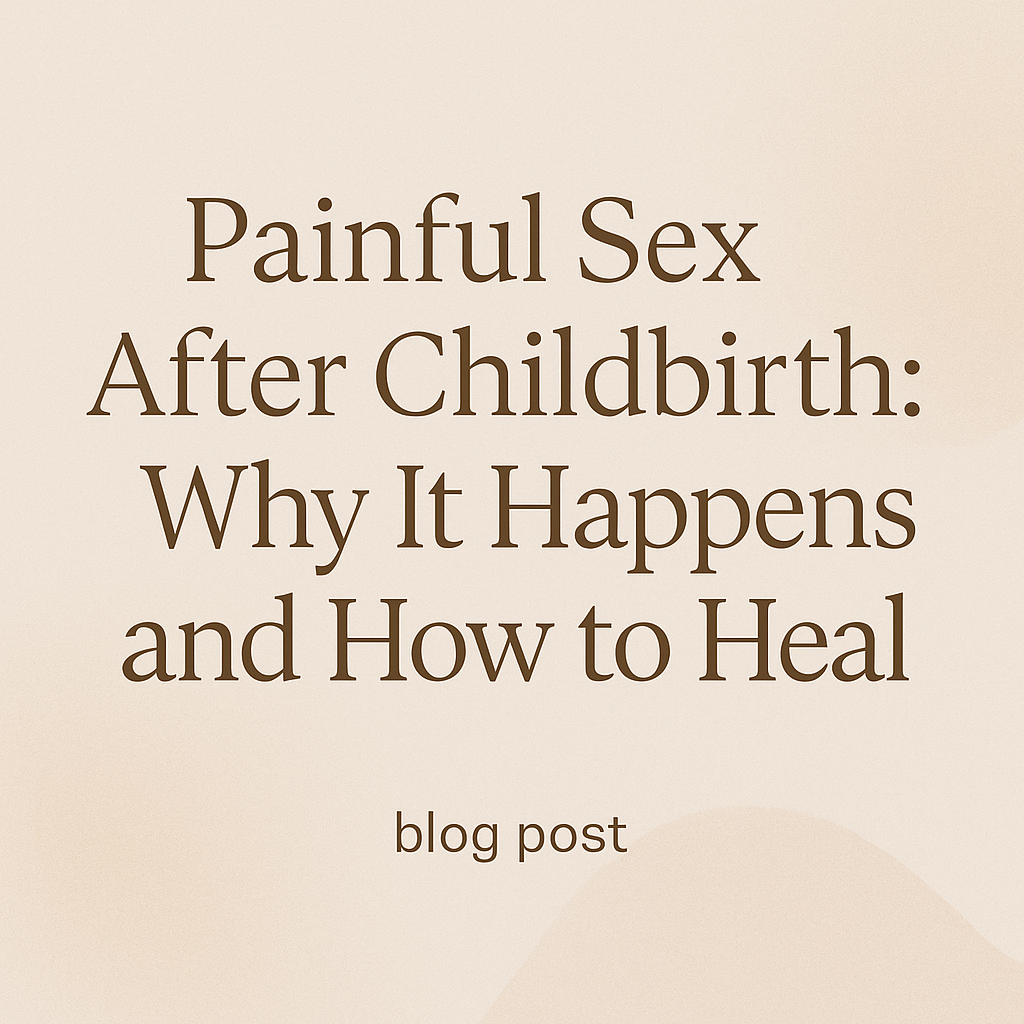
Painful Sex After Childbirth: Why It Happens and How to Heal
Share
Bringing life into the world is extraordinary — but for many women, intimacy after childbirth doesn’t feel the same. If sex has become uncomfortable, burning, or painful postpartum, you’re not alone. Studies show that more than one in three women experience painful sex in the months after giving birth [PubMed].
The good news? Painful sex after childbirth is usually temporary and treatable. Let’s look at why it happens, what the science says, and how you can start healing.
Why Painful Sex Happens After Birth
1. Hormonal Changes & Vaginal Dryness
Estrogen levels drop dramatically after birth, especially if you’re breastfeeding. This leads to thinner, drier vaginal tissues, sometimes referred to as Genitourinary Syndrome of Menopause (GSM) when it occurs later in life. This dryness can make penetration feel sharp or burning [Cleveland Clinic].
2. Perineal Trauma or Scarring
Tears, episiotomies, or stitches can cause lingering tenderness, tightness, or scar tissue sensitivity. Even months later, scar tissue may feel different and create pulling sensations during sex [Systematic Review, Int J Impot Res 2021].
3. Pelvic Floor Muscle Tension
During pregnancy and delivery, pelvic floor muscles stretch and sometimes weaken. Ironically, some women develop overactive, tense pelvic floors afterward, leading to a “blocked” or painful feeling with penetration. Clinical trials show that pelvic floor physical therapy (PFPT) can significantly improve postpartum dyspareunia [Randomized Clinical Trial, Int Urogynecol J].
4. Emotional & Psychological Factors
Exhaustion, anxiety, body image concerns, or even fear of pain itself can make it difficult to relax — and tension only worsens discomfort.
How Long Does Painful Sex Last Postpartum?
A 2021 systematic review and meta-analysis covering over 11,000 women found that dyspareunia is most common in the first 3 months postpartum, but up to 20% of women still report pain a year after giving birth [PubMed].
This shows that while many women improve naturally, persistent pain deserves attention and support.
Evidence-Based Ways to Heal
- Lubricants & Moisturizers: First-line relief for dryness. Choose body-safe, fragrance-free products [Cleveland Clinic].
- Local Estrogen (if breastfeeding-safe): Can restore tissue health; consult your provider [CCJM].
- Pelvic Floor Physical Therapy: Multiple randomized clinical trials confirm PFPT improves pain, function, and confidence [Int Urogynecol J].
- Scar Massage & Desensitization: With medical guidance, gentle techniques can soften and retrain tissues.
- Dilator Therapy: Graduated, evidence-based dilator programs may help retrain pelvic floor relaxation; best used under professional guidance [Systematic Review, J Sex Med].
- Communication & Emotional Care: Open conversation with your partner and, if needed, a sex therapist can ease anxiety and rebuild connection.
When to See a Clinician
Seek professional support if:
- Pain is severe or worsening over time.
- You have bleeding, unusual discharge, or new pelvic symptoms.
- Pain persists beyond 6–12 months despite self-care.
A Private, Gentle Resource for Healing
If you’re struggling with painful sex after childbirth, remember: you don’t have to face it alone, and you don’t have to stay silent.
Our ebook, Overcoming Painful Sex, was created to give women compassionate, evidence-based support. Inside you’ll find:
- Explanations of postpartum causes of pain.
- Gentle step-by-step exercises to retrain your body.
- Affirmations and worksheets to rebuild confidence.
- A safe, discreet way to take back control at your own pace.
👉 Download your guide today and take the first step toward comfort and intimacy again.
References
-
Banaei, M., et al. Prevalence of postpartum dyspareunia: a systematic review and meta-analysis. PubMed
-
Cleveland Clinic. Vaginal Atrophy (Genitourinary Syndrome of Menopause). Cleveland Clinic
-
Ghaderi, F., et al. Pelvic floor rehabilitation in women with dyspareunia: randomized clinical trial. PubMed
-
Parish, S.J., Faubion, S.S. Genitourinary syndrome of menopause: overview and management. Cleveland Clinic J Med. CCJM
-
Rosenbaum, T.Y., et al. The role of dilator therapy in female sexual pain disorders: A systematic review. PubMed


